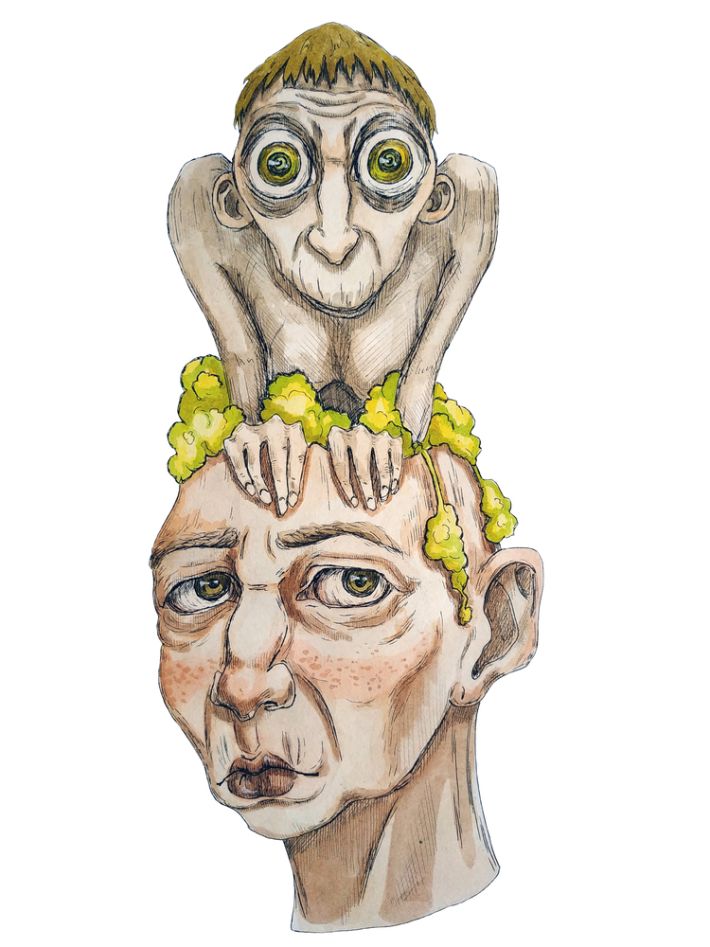- in Mental Health by Tony
The impact of intrusive thoughts on your mental health

The continuous presence of intrusive thoughts can create a constant sense of unease and fear. They have the power to make you question your own morality and sanity. The toll they take on you is not only mental but physical as well.
The exhaustion caused by these persistent thoughts can affect your concentration, making it difficult to complete tasks or make decisions. Sleep disturbances may also occur due to the constant rumination induced by intrusive thoughts.
More...
The emotional impact of intrusive thoughts should not be overlooked. Heightened anxiety levels and constant worry about the disturbing content can lead to feelings of shame, guilt, or self-doubt. These intrusive thoughts may also trigger depressive symptoms such as sadness, hopelessness, or a loss of interest in once-enjoyable activities.
Moreover, intrusive thoughts can significantly affect your relationships with others. Out of fear that others will judge you based on your thoughts’ content, you may isolate yourself from social interactions.
Interactions with loved ones may become strained as you struggle to explain why you are feeling distressed or preoccupied. In light of this, seeking professional help is crucial when dealing with the impact of intrusive thoughts on your mental health.
Mental health professionals can offer guidance and support through therapy techniques like cognitive-behavioural therapy (CBT) or exposure response prevention (ERP). With their assistance, you can develop coping mechanisms and strategies to reduce the frequency and intensity of these intrusions.
Remember that you are not alone in facing the impact of intrusive thoughts on your mental health. With proper support and treatment from professionals, it is possible to regain control over your mind and improve your overall well-being.
Intrusive thoughts can create a constant sense of unease and fear.

Intrusive thoughts, those pesky and unwelcome visitors to our minds, have the uncanny ability to weave a web of unease and fear that can feel unrelenting.
These thoughts, like unwelcome guests overstaying their welcome, can pop up at inconvenient times, disrupting our peace of mind.
Recognising that these thoughts are not a reflection of who we are, but rather a product of our complex and intricate minds, is essential.
By acknowledging their existence and seeking support, we can regain control and find solace in our thoughts again.
1: Fear of causing harm to oneself or others
2: Unwanted violent or aggressive thoughts
3: Disturbing sexual thoughts or images
4: Obsessions with cleanliness or germs
5: Fear of being responsible for a tragic event
6: Intrusive thoughts about religion or blasphemy
7: Constant worry about making mistakes or being judged
Let's talk about intrusive thoughts and how they can affect our mental health.

Intrusive thoughts, a common phenomenon in the realm of mental health, have a profound impact on individuals’ well-being. These thoughts, which can be distressing and unwanted, often invade the mind unexpectedly, causing a significant disruption to one’s daily life.
They may manifest as disturbing images, impulsive urges, or irrational fears, leading to heightened anxiety and distress. Intrusive thoughts can range from harmless to more severe, such as thoughts of violence or self-harm, and can be particularly distressing for those experiencing them.
The constant bombardment of these intrusive thoughts can be exhausting, affecting concentration, sleep patterns, and overall mental stability. It is important to recognise that intrusive thoughts do not indicate any moral failing or character flaw, but rather highlight the human mind’s complex nature.
Seeking professional help, such as therapy or counselling, can provide influential strategies for managing and minimising the impact of intrusive thoughts on mental health.
Understanding Intrusive Thoughts
Understanding intrusive thoughts can be a perplexing endeavour. Often unwanted and distressing, these thoughts can sometimes burst into our minds. They may range from disturbing or violent images to reflections challenging moral values.
Intrusive thoughts are not subjective of one’s character or desires, but rather a common occurrence experienced by many individuals. They can be triggered by stress, anxiety, or even the random firing of neural circuits in the brain.
It is important to note that having intrusive thoughts does not mean a person is mentally ill or dangerous. In fact, research suggests that the more we try to suppress these thoughts, the stronger and more persistent they become.
Conventional therapies often urge you to avoid suppressing your thoughts because intrusions might rebound in intensity and frequency to exacerbate the disorder. Historically, you can thank the Freudian proposal that repressed content persists in the unconscious mind, resurfacing indirectly through symptoms and dreams.
Daniel Wegner, a Harvard social psychologist in the early 1980s, then popularised the theory that trying to avoid a thought often backfires by making that thought more pervasive.
However, in 2017, Schmitz, questioned the inhibitory control over unwanted thoughts and intrusive symptomatology.
Further experiments at the University of Cambridge in the UK (2023) agreed that conventional thinking may be wrong and that blocking out negative thoughts is more beneficial for our mental health.
Participants included many with profound depression, anxiety, and COVID-19 pandemic-related post-traumatic stress.
Psychoanalysis previously introduced the idea that people should talk through their negative thoughts rather than suppressing them.
By rehearsing, accepting and acknowledging these thoughts without judgment was recommended.
Understanding that they are just thoughts and do not define who we are, we can reduce the distress they cause.
But, ineffective suppression strategies, metacognitive beliefs, and personality traits were addressed in this current study.
It is also noteworthy that the opposite approach by McLean, in the previous year being, 2022, stated that exposing people with phobias or PTSD to the object or activity they fear, can help reduce their anxiety.
Additionally, seeking support from a mental health professional can benefit those who find these thoughts interfering with their daily lives.
Therapy techniques such as cognitive-behavioural therapy (CBT) can help individuals develop coping strategies and challenge the irrational beliefs associated with intrusive thoughts.
Understanding intrusive thoughts can empower individuals to manage and navigate them more easily.
- Defining intrusive thoughts and how they differ from regular reflections.

Intrusive thoughts, often misunderstood and shrouded in mystery, pop into our minds seemingly out of nowhere. They can be distressing, disturbing, and even bizarre, causing immense turmoil and anxiety.
Unlike everyday thoughts that we consciously generate, intrusive thoughts intrude upon our consciousness without our control or consent. They can be disturbing images, violent fantasies, or irrational fears, leaving us confused and even guilty about having such thoughts.
While everyone experiences intrusive thoughts to some extent, individuals with conditions like obsessive-compulsive disorder (OCD) may find them more frequent and intense, interfering with their daily lives.
It is crucial to understand that having intrusive thoughts does not make a person crazy or dangerous. They are a normal part of human experience, albeit unwelcome.
Seeking professional help and support can provide strategies and coping mechanisms to manage intrusive thoughts effectively.
- Intrusive thoughts often involve distressing or unwanted content
Intrusive thoughts, those pesky wanderers of the mind, tend to tiptoe into our consciousness uninvited. They can be like unwelcome guests, bringing with them distress and discomfort. Often laden with unwanted content, these thoughts can take on many forms.
They might involve disturbing images, violent impulses, or taboo subjects that make us squirm in our seats. It’s essential to recognise that everyone experiences intrusive thoughts to some degree, but for some individuals, they can become more frequent or intense, causing significant distress.
It’s not uncommon to feel overwhelmed or even frightened by these thoughts, but it’s crucial to remember that they do not define us.
They are merely random mental events that occur within the complex workings of our brains. By understanding the nature of intrusive thoughts and learning healthy coping strategies, we can navigate through their murky waters more easily and find solace in a calmer state of mind.
- Intrusive thoughts and their potential causes
Researchers have identified several potential factors that may contribute to their occurrence. These can include biological factors, such as neurotransmitter imbalances or brain structure, and psychological factors, such as unresolved trauma or anxiety disorders.
Environmental factors, such as exposure to traumatic events or a high-stress environment, can also play a role. It is important to remember that experiencing intrusive thoughts does not necessarily indicate a mental health disorder.
Still, if these thoughts become persistent or significantly interfere with daily functioning, it is essential to seek professional help.
The Hidden Meaning of Intrusive Thoughts
Though often dismissed as random or meaningless, intrusive thoughts can hold a more profound significance. These unwelcome and often disturbing thoughts that pop into our minds seemingly out of nowhere can be perplexing and unsettling.
However, psychologists have found that these intrusive thoughts can provide valuable insights into our subconscious desires and fears. They can provide a window into our deepest thoughts and emotions, revealing aspects of ourselves that we may not be consciously aware of.
We can better understand our inner workings and uncover unresolved issues or conflicts by analysing and understanding these intrusive thoughts.
So, instead of ignoring or suppressing these thoughts, it may be beneficial to explore their hidden meanings.
This exploration can lead to personal growth and self-awareness, helping us navigate through life with a greater understanding of ourselves and our motivations.
Personality traits
Personality traits refer to the unique patterns of thoughts, feelings, and behaviours that define an individual's characteristic way of interacting with the world and others. These traits are relatively stable over time and across various situations, influencing how a person perceives, thinks, and behaves in different circumstances.
There are various theories and models that attempt to explain personality traits. One widely recognized model is the Big Five personality traits, also known as the Five-Factor Model (FFM). According to this model, there are five broad dimensions of personality:
1. Openness to experience: This trait reflects a person's preference for novelty, creativity, and willingness to explore new ideas and experiences. Individuals high in openness tend to be curious, imaginative, and open-minded.
2. Conscientiousness: This trait describes a person's level of organization, responsibility, and self-discipline. Individuals high in conscientiousness are likely to be reliable, diligent, and tend to follow rules and schedules.
3. Extraversion: This trait represents the degree to which a person seeks social stimulation and enjoys being in the company of others. Individuals high in extraversion are often outgoing, energetic, and draw energy from social interactions.
4. Agreeableness: This trait reflects a person's tendency to be cooperative, empathetic, and considerate towards others. Individuals high in agreeableness are typically compassionate, trusting, and strive for harmony in interpersonal relationships.
5. Neuroticism: This trait pertains to emotional stability and the tendency to experience negative emotions such as anxiety, sadness, and irritability. Individuals high in neuroticism may be more prone to stress, mood swings, and worry.
It is important to note that these traits exist on a continuum, and most individuals possess a combination of varying degrees across these dimensions.
Furthermore, other personality theories and models may propose additional traits or different categorisations.
Exposure and response prevention (ERP) for intrusive thoughts

Exposure and response prevention (ERP) is a highly effective treatment for individuals struggling with intrusive thoughts. ERP involves intentionally exposing oneself to distressing thoughts and situations while refraining from engaging in the typical compulsive behaviours that provide temporary relief.
By gradually facing these fears and resisting the urge to respond compulsively, individuals can retrain their brains and reduce the power of intrusive thoughts over time.
Exposure and response prevention is an evidence-based therapy that has been shown to improve symptoms of obsessive-compulsive disorder and other related conditions significantly.
What are the differences between intrusive thoughts and inner voice?
The main difference between intrusive thoughts and an inner voice is the level of control one has over them. Intrusive thoughts are typically unwanted and intrusive, often causing distress or anxiety.
They can pop into one's mind without warning and are difficult to control or stop. These thoughts can be repetitive, irrational, and even violent, causing significant disruption to daily life.
On the other hand, an inner voice refers to the internal dialogue or self-talk that occurs within one's mind. It is a more conscious and controllable thought process that reflects one's own beliefs, values, and interpretations.
While inner voice can also be repetitive or negative, it is generally more manageable and can be influenced or redirected through mindfulness or cognitive techniques.
Emotional regulation on intrusive thought
Emotional regulation is a fundamental aspect of managing intrusive thoughts. When faced with these distressing and persistent thoughts, developing strategies that help regulate our emotions is essential.
One effective technique is mindfulness, which involves being fully present in the moment and observing our thoughts without judgment. By practising mindfulness, we can cultivate a greater insight into self-awareness and learn to detach ourselves from the negative emotions associated with intrusive thoughts.
Another helpful approach is engaging in activities promoting relaxation and stress reduction, such as deep breathing exercises or hobbies that bring joy and distraction.
Additionally, seeking support from loved ones or professionals can provide invaluable assistance during challenging times.
Prioritising self-care and reaching out for help are essential steps towards leading a balanced and fulfilling life amidst the turmoil of intrusive thoughts.
Metacognitive beliefs
Metacognitive beliefs refer to a person's thoughts and beliefs about their own thinking processes and abilities. These beliefs involve an individual's awareness and understanding of how their mind works, including their ability to control and regulate their thoughts, attention, and memory.
Metacognitive beliefs can have a significant impact on a person's behaviour, self-perception, and overall mental well-being. These beliefs can influence how confident a person feels about their mental abilities, and can also influence their motivation to engage in certain tasks or activities.
Developing healthy and accurate metacognitive beliefs is crucial for effective self-reflection, problem-solving, and learning.
Metacognitive beliefs can cause a psychological disorder because they encourage excessive worry and rumination, prolonging negative emotions.
Metacognitive Therapy (MCT)
Metacognitive Therapy (MCT) is a form of psychotherapy (talk therapy) based on information processing theory that focuses on changing a person’s thoughts and beliefs about their thinking rather than directly targeting the content of their thoughts. Mental illness is maintained through prolonged thinking styles like rumination and worry.
It involves helping individuals become more aware of their own thinking patterns and how these patterns may contribute to their emotional distress. Metacognitive Therapy aims to help individuals develop more adaptive and helpful ways of thinking, thereby reducing their symptoms of anxiety, depression, OCD, social phobia and other mental health issues.
The therapy involves teaching individuals specific strategies and techniques to monitor and modify their thinking and encouraging them to develop a more flexible and balanced perspective. Overall, MCT provides individuals with the tools and skills to understand better and regulate their thoughts and emotions, promoting long-term mental well-being.
Metacognitive Therapy does not include meditation, applied relaxation, breathing techniques, or cognitive restructuring.
Conclusion
Understanding intrusive thoughts’ hidden meaning is paramount for one’s overall well-being. Intrusive thoughts can often be distressing and disruptive, causing anxiety and unease.
By delving deeper into the underlying message behind these thoughts, individuals can better understand their own emotions and experiences. This insight allows for developing proactive management and coping strategies, leading to a greater sense of control and improved mental health.
Furthermore, recognising the hidden meaning of intrusive thoughts can unveil unresolved issues or traumas that may have been buried deep within the subconscious.
Addressing these underlying issues is crucial for personal growth and healing. Understanding intrusive thoughts’ hidden meaning empowers individuals to navigate their inner world with greater clarity and self-awareness, finally enhancing their overall well-being.
Finally, therapies are still evolving; as Freud suggested, suppressing distressing content may preserve it in the unconscious, where it could shape the individual’s moods, perceptions, and actions.
However, a one-size-fits-all approach may not be relevant in this case; the idiom, horses for courses, must be considered with critical thinking on these pertinent issues. We must recognise when we need professional help and feel free to seek the best therapy or counselling to address our problem.
McLean, C. P., Levy, H. C., Miller, M. L., & Tolin, D. F. (2022). Exposure therapy for PTSD: A meta-analysis. Clinical Psychology Review, 91, 102115. https://doi.org/10.1016/j.cpr.2021.102115
Mamat, Z., & Anderson, M. C. (2023). Improving mental health by training the suppression of unwanted thoughts. Science Advances. https://doi.org/adh5292
Schmitz, T. W., Correia, M. M., Ferreira, C. S., Prescot, A. P., & Anderson, M. C. (2017). Hippocampal GABA enables inhibitory control over unwanted thoughts. Nature Communications, 8 (1), 1-12. https://doi.org/10.1038/s41467-017-00956-z
https://www.health.harvard.edu/mind-and-mood/managing-intrusive-thoughts

